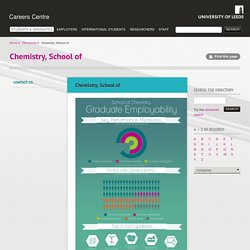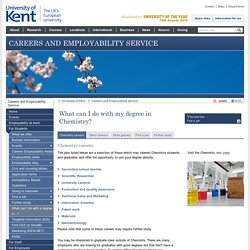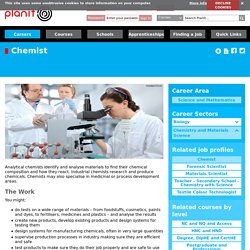

Downloads. Chemistry, School of. Chemistry, School of Key measures: Positive Outcomes: 88.4%, Graduate prospects: 77.6%, Graduate employment: 80% Graduate destinations: Work Full-time: 51%, Work Part-time: 9%, Work & Study: 0%, Further study: 31%, Unemployed: 9% Top industry sectors: Science, Research & Development; Event Management, Leisure, Hospitality & Tourism; Buying, Selling & Retail; Manufacturing, Processing & Production; Information Technology Salary levels: Under £10,000: 5%, £10,000-£19,999: 53%, £20,000-£29,999: 42%, £30,000-£39,999: 0%, Over £40,000: 0% The Leeds Network We have an extensive network of alumni with a wide range of experiences, doing all kinds of jobs.

A Future in Chemistry. It can be hard to get chemistry related work experience, especially in labs.

An easier option might be to look for chemical companies in your area and then ask if they might have work experience in some of the other business functions within the company. This is a good way to learn more about the uses and applications of chemistry without having to be fully trained to be safe in a laboratory. It is also sometimes easier to ask for work-shadowing opportunities, rather than direct hands-on work experience. Have a look online for possible companies. © R Bowles Your local hospital might also be worth approaching for work experience in the pathology labs, which use a lot of techniques involving chemistry. The Royal Society of Chemistry does not provide work experience for school students.
Additional links. What can I do with my chemistry degree? Studying chemistry allows you to develop subject-specific and transferable skills which are valued by all employers, meaning your future career doesn't have to be in a lab… Job options Jobs directly related to your degree include:

Chemistry degree career options. Chemistry students typically develop strong analytical, problem solving and time management skills, which make them highly employable in a range of professions.

Many chemistry graduates go on to careers in business, science or education. Employability skills. There are many different careers open to you if you want to work in a laboratory but a chemistry qualification also opens up a wide range of alternative career options.

Skillsdoc1. A Future in Chemistry. Got a Degree... What Next?- Learn Chemistry. What can I do with my degree in Chemistry? - Careers and Employability Service. Every year the University of Kent participates in the Destinations of Leavers from Higher Education survey to find out what graduates are doing after finishing their courses.

You can access this information here [33]. Please note that this webpage is password protected and only accessible by University of Kent staff and students. The examples shown reflect the destinations of students six months after graduation. Keep in mind that at this early stage some graduates may not have made long-term career choices or entered a graduate-level job role. You will find many examples of graduates who have entered graduate schemes and professional careers, but there may also be some graduates working in temporary employment or taking time out to volunteer, travel or gain appropriate work experience.
The data is collected by UK universities and submitted to the Higher Education Statistics Agency (HESA), which publishes summary reports for all UK Higher Education Institutions. A Future in Chemistry. Chemist Job Information. Page Content Chemist Hours30-40 per weekStarting salary£16,000 + per year If you are fascinated by chemistry and enjoy experimenting, this job could be ideal for you.

Chemists study the make-up of chemicals and materials. They also investigate how they interact and behave under different conditions. To be a chemist, you will need to have an enquiring mind and be keen to explore and solve problems. Chemist Chemistry and Materials Science. Analytical chemists identify and analyse materials to find their chemical composition and how they react.

Industrial chemists research and produce chemicals. Chemists may also specialise in medicinal or process development areas. ABPI Careers. Teacher Training Scholarships. What are the benefits?

Our scholars receive: a £25,000 tax-free bursary from the Department for Educationfree classroom materials including books, posters and a lab coatmentoring by an expert chemistry teachermeetings with other scholars from their regionfree online CPD courses focused on active learning in chemistryopportunities to represent the Royal Society of Chemistry at meetings and conferences on chemistry and chemistry education. Our scholars also get free membership of the Royal Society of Chemistry for two years. This includes: Education in Chemistry bimonthly magazine, with news, reviews and opinions written by teachers for teachersaccess to Talk Chemistry, our online forum for teachers to share lesson plans, innovative resources and teaching ideasaccess to national and regional networks for chemistry teachers and trainee teachers up to a third off books from top scientific publishers.
To find out more about our scholarship, watch the following video. How do I apply? Apply now. Home - MyRSC. Membership and professional community. Connect with others Our community brings together scientists, teachers, industry experts and students from across the world.

We'll help you tap into a global network that offers endless opportunities to promote and share your work, ideas and expertise. Supporting individuals Keep your professional knowledge up to date through a variety of networks, high quality research, publications, and information services. Take advantage of our specialist career advice and professional development opportunities including practical support and grants. Supporting organisations From schools, colleges and universities through to small and large companies, we can support your organisation by giving you the resources, networks and recognition you need.
Engage with us For both individuals and organisations, there are a range of ways to support our activities. Join us Our members make us what we are – a vibrant and diverse worldwide community, advancing excellence in the chemical sciences. Manage my membership. SCI - Membership and Networks. Downloads pdf 1 Chemicals Brochure FINAL JAN 09. Search. Displaying: 25 / 100 / 200 results Why social media matters Sites such as Twitter, Facebook and LinkedIn are ideal for building connections and finding a job, explains Charlotte Ashley-Roberts Networks of power Experienced job seekers should make use of their contacts when finding a new role, says Charlotte Ashley-Roberts Career turning points Robert Bowles asks how you should react when opportunity unexpectedly presents itself What are you worth?
SCI - Home. Chemical Industries Association > Home. Links for Chemists - eLearning Chemistry 3. Skills in Mathematics and Statistics in Chemistry and Tackling Transition. Chemical Industries Association : Press Release.